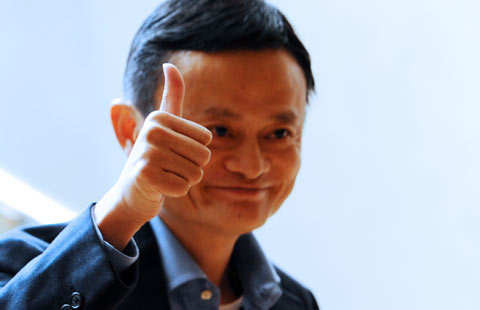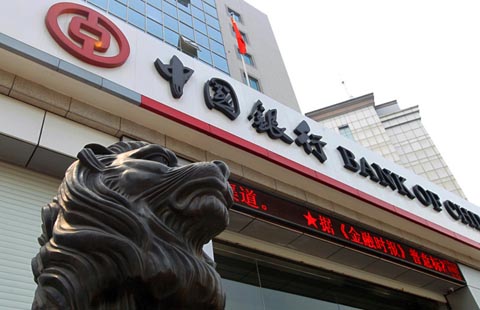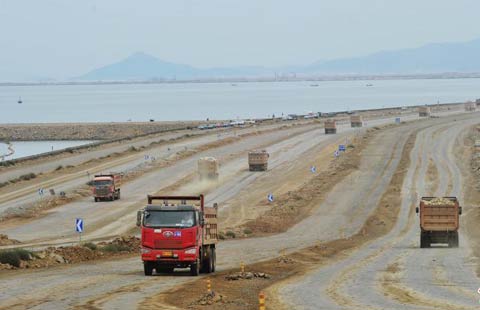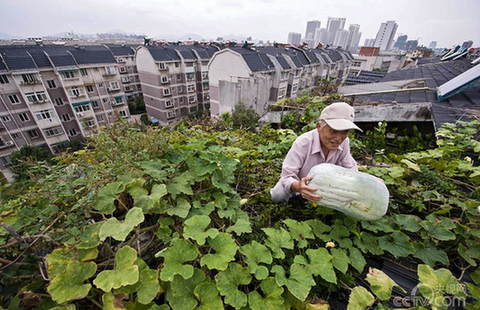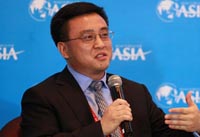Regional ties to enter 'diamond decade'
By GAO CHANGXIN/LI XIANG (China Daily) Updated: 2014-09-17 08:01
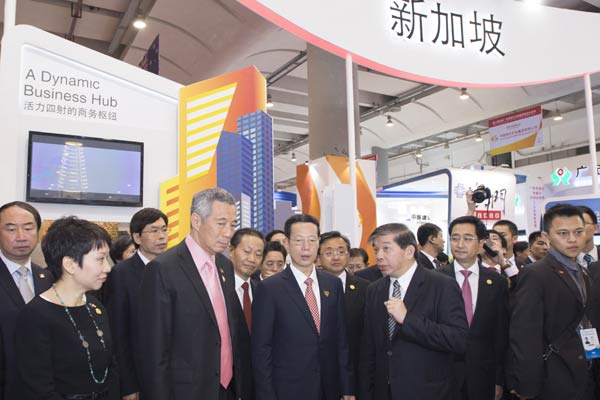 |
|
Vice-Premier Zhang Gaoli (center) and Singapore Prime Minister Lee Hsien Loong (second from left) attend the launch ceremony of the Singapore Pavilion on Tuesday after the 11th China-ASEAN Expo opened in Nanning, capital of the Guangxi Zhuang autonomous region. XINHUA |
Vice-premier on hand to kick off 11th China-ASEAN Expo in Nanning
China upped its commitment to strengthen ties with the Association of Southeast Asian Nations, seeking to bring bilateral relations into a new "diamond decade".
Vice-Premier Zhang Gaoli on Tuesday made six proposals, including expanding the China-ASEAN free-trade agreement, strengthening political mutual trust and maritime cooperation, and boosting student exchanges.
"China-ASEAN relations are at a new historical starting point, and the Chinese government ... will put ASEAN countries as China's diplomatic priority," said Zhang.
Zhang made the remarks at the opening ceremony of the 11th China-ASEAN Expo in Nanning, the Guangxi Zhuang autonomous region. A major platform for dialogue between China and ASEAN member countries, the annual event was launched in 2003.
|
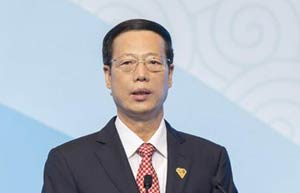 |
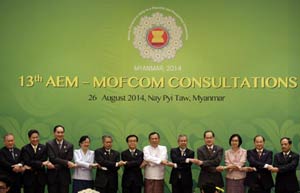 |
China's relations with ASEAN are of crucial significance as the US "pivots" its strategic focus to Asia in an effort experts say is intended to contain China's rise. With a belligerent Japan to its east, being on good terms with its western neighbors is essential to providing China with much needed regional stability as it focuses on growing its economy.
Deepening economic cooperation and creating a China-ASEAN community of interest will serve as a foundation of mutual trust and will reduce conflicts, Zhang said. China will strive to raise bilateral trade to $500 billion in 2015 and $1 trillion by 2020, he added.
Bilateral trade jumped to $443.8 billion in 2013 from $60 billion in 2003.
China also will offer 150,000 college slots to students from ASEAN countries, as well as building financial infrastructure to strengthen the application of the yuan in China-ASEAN trade.
Zhang reiterated China's goal of holding talks directly with countries with which it has border disputes in order to foster mutual political trust. He proposed making 2015 the year of China-ASEAN maritime cooperation. It is part of a plan President Xi Jinping announced last year to build a maritime Silk Road that will revive a trade route running from China through Southeast Asia and the Indian Ocean to Europe.
Myanmar Vice-President U Nyan Tun said Myanmar supports the initiative proposed by Xi. "The current cooperation between China and ASEAN countries is one advantage we need to seize to materialize the aims of the maritime Silk Road," he said.
"Countries need to explore the ways and means of narrowing their differences and overcoming challenges such as regional disputes."
Lee Chee Leong, Malaysian deputy minister of International Trade and Industry, said he is confident that, supported by the expo, China-ASEAN trade will reach new heights, adding that with a population of 550 million and a combined GDP of $5.6 trillion, the region has become an increasingly attractive market for China.
"Chinese companies seeking to expand activities in the ASEAN region can also leverage Malaysia's strategic position, business linkages and networks," he said.

- China suggests six steps to boost ASEAN ties
- Singapore seeks to expand ties with China, ASEAN
- Australia keen to boost ties with China, ASEAN
- The 11th China-ASEAN Expo starts in Nanning
- China-ASEAN expo hoped to promote discussion on developing ties: FM
- Financial services to buoy China-ASEAN trade ties
- China Offshore Oil Engineering eyes more revenue from abroad
- Companies bask in 'Alibaba effect'
- Toyota officials appearing on NDRC's radar
- Shanghai enters Asia gold race
- EU envoy to China: Probes not targeting foreign firms
- FDI dips for 2nd straight month
- Funds from China boost roads, ports in Sri Lanka
- iPhone 6 spawns Chinese satire
